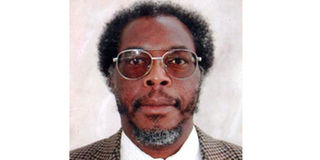Prime
Obituary: The passing of a great scientist

Dr Alex Tindimuboona passed away on September 30 in Addis Ababa where he was working. Courtesy Photo.
What you need to know:
Dr Alex Tindimuboona was a man passionate about the enviroment. He pursued numerous initiatives towards improving education and enviromental studies. He is remembered as a brilliant, quiet man.
Despite being one of the finest scientists the country has produced, Dr Alex Tindimuboona chose to live quietly. He was not one to look for publicity, as his colleague, Dezi Ngambechi reveals. His passing in Addis Ababa on September 30, was just as quiet. He was 61.
His death said to be of natural causes, marked the passing of a lofty figure whose impact on development of the sciences in the country cannot be underestimated.
Tindimuboona was the first Ugandan to acquire a degree in quantum chemistry. He was also awarded severally for his efforts to promote science and technology for development in Africa.
His qualifications
After his secondary education, Tindimuboona moved to the University of Dar-es-Salaam and did a BSc in Chemistry.
He had just come back to Uganda to the Makerere University post graduate school, when he got a scholarship to further his studies at the University of Alberta, Canada. Dr Tindimuboona then became the first Ugandan to acquire a PhD in quantum chemistry in 1979.
A green revolution champion
In 2003, he was appointed chief scientific officer for the United Nations Economic Committee for Africa (UNECA) based in Addis Ababa. He was involved in a project titled African Green Revolution that brought together over 30 countries and over 40 scholars. Dr Tindimuboona’s lot under the initiative was concept methodology; assessment of criteria of African countries and their readiness to undertake the green revolution (explain what this was). Again he was recognised by the UN for his efforts.
Despite the recognition, this project later collapsed and Dr Tindimuboona was moved to head the ICT department at UNECA the position he was holding at the time of his passing. He was just four months from retirement.
According to Ngambechi, the demise of the Green Africa Revolution was a deep disappointment for Tindimuboona. “He had a concept and vision and it all came to nothing. Last time I saw him he was a dejected man,” he says.
After his stint abroad, he joined the University of Nairobi as a lecturer in 1981 until 1988. A senior lecturer, Tindimuboona joined the African Academy of Sciences, where he won a UNESCO award for his work in promoting sciences.
Commendable job
The late Tindimuboona set up a consultancy on scientific concepts in 1993. By 1998, he had become actively involved with research in the country and was appointed as research director for Network of Ugandan Researchers and Research Users (NURRU), a post he held until 2002. “Among his duties was to co-coordinate researchers, give them training, get sponsors for the research projects and he did his job really well. The association was very active during his term,” says Ngambechi who worked with the late Tindimuboona on several researches.
He put special effort in seeing to it that members of the research network received training and that the findings could be accessed by research users.
He also took part in several researches himself, one with Prof Sunday Mutabaazi and Prof Ngambechi that explored sustainable farming in a fragile mountain ecosystem with case study of central Kigezi.
The findings which were presented to political leaders drew quite a lot of attention.
He also carried out another research with Professor Zake Kitangulu on poverty reduction in the Kigezi region as part of the Presidential Initiative on Poverty Reduction.
This was between 2001-2002 and though the findings of this study were not presented publicly, Tindimuboona and company had made recommendations which involved tea growing, bananas and mushrooms, growing Arabica coffee as intervention that could help reduce poverty.
Educating the young generation
Away from the career front, Tindimuboona made efforts to improve the livelihoods of others through an NGO, ASTEX (African Science Technology Exchange), which facilitated needy students to pursue their careers. “He kept it low-key, but helped many young people achieve their dreams,” says Rukanyangira who worked with Tindimuboona from various seminars they held on poverty reduction in central Kigezi.
He also started the Mabindi University Focused Education Fund to get more youth from his former primary school Mabindi into university. This was after Tindimuboona realised that there was a 20 year gap between him and the next person who went to university.
He is survived by Laura Perley to whom he has been married for 31 years and they didn’t have children. For him, what mattered was that he was able to serve the world, says Rukanyangira.
Prof Ngambechi summarises Tindimuboona’s life as a high profile, brilliant mind that made his difference quietly. Tindimuboona was born in Mabindi, Rukungiri District. He had his primary education in Mabindi Primary School before moving on to Ntare School, where he finished his secondary education in five years instead of the normal six.




